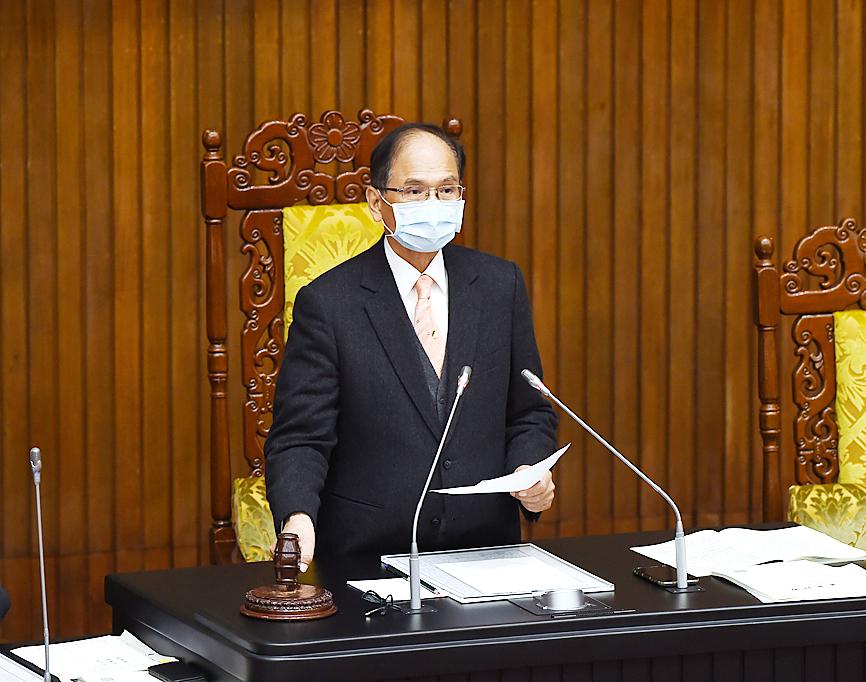The Legislative Yuan yesterday approved amendments to the Income Tax Act (所得稅法) that are on July 1 to place a 45 percent capital gains tax on individuals and businesses selling real estate within two years of purchase.
The bill, intended to curb real-estate speculation, was passed after legislators in interparty negotiations on Wednesday resolved areas of disagreement, including setting July 1 for the changes to take effect.
The revisions are aimed at improving the “integrated house and land transaction income tax,” which was introduced in 2016 to reduce speculation, especially in the residential housing market, but has failed to act as a deterrent amid high liquidity and low interest rates.

Photo: Fang Pin-chao, Taipei Times
Under the changes, the tax on individuals and businesses would be set at 45 percent on gains from the sale of property within two years of purchase and 35 percent on gains from properties sold within two to five years of purchase.
Currently, the 45 percent rate applies only to gains on property sales within the first year of purchase, while the 35 percent rate applies only on sales made within one to two years of purchase. Those rates only apply to individuals.
Businesses pay an across-the-board rate of 20 percent on such gains under corporate income tax rules.
By imposing the same tax rate on individuals and businesses, the bill aims to prevent individuals from setting up companies to trade property and pay only 20 percent on their gains.
For people and companies buying property from outside Taiwan, the 45 percent tax would apply to gains on property sales within two years of purchase, up from one year, after which the rate would remain at a flat 35 percent, according to the bill.
The tax on individuals for gains on properties sold five to 10 years after purchase would be 20 percent, and 15 percent thereafter.
For companies, the rate would return to 20 percent after five years.
The revisions also widen the scope of properties to which the tax applies. While the tax previously only applied to transactions of existing residential properties not considered to be for “self-use,” under the amended version it would apply to the sale of presale homes, above-ground use of land rights and special shareholdings.
The measures would apply retroactively to transactions dating back to 2016.
Ahead of the bill’s passage, Chinese Nationalist Party (KMT) Legislator and Finance Committee convener Tseng Ming-chung (曾銘宗) said his party had several other proposals in the pipeline to increase access to housing, including raising taxes on owners of multiple residential properties and increasing transparency in the rental market.

CARROT AND STICK: While unrelenting in its military threats, China attracted nearly 40,000 Taiwanese to over 400 business events last year Nearly 40,000 Taiwanese last year joined industry events in China, such as conferences and trade fairs, supported by the Chinese government, a study showed yesterday, as Beijing ramps up a charm offensive toward Taipei alongside military pressure. China has long taken a carrot-and-stick approach to Taiwan, threatening it with the prospect of military action while reaching out to those it believes are amenable to Beijing’s point of view. Taiwanese security officials are wary of what they see as Beijing’s influence campaigns to sway public opinion after Taipei and Beijing gradually resumed travel links halted by the COVID-19 pandemic, but the scale of

TRADE: A mandatory declaration of origin for manufactured goods bound for the US is to take effect on May 7 to block China from exploiting Taiwan’s trade channels All products manufactured in Taiwan and exported to the US must include a signed declaration of origin starting on May 7, the Bureau of Foreign Trade announced yesterday. US President Donald Trump on April 2 imposed a 32 percent tariff on imports from Taiwan, but one week later announced a 90-day pause on its implementation. However, a universal 10 percent tariff was immediately applied to most imports from around the world. On April 12, the Trump administration further exempted computers, smartphones and semiconductors from the new tariffs. In response, President William Lai’s (賴清德) administration has introduced a series of countermeasures to support affected

Pope Francis is be laid to rest on Saturday after lying in state for three days in St Peter’s Basilica, where the faithful are expected to flock to pay their respects to history’s first Latin American pontiff. The cardinals met yesterday in the Vatican’s synod hall to chart the next steps before a conclave begins to choose Francis’ successor, as condolences poured in from around the world. According to current norms, the conclave must begin between May 5 and 10. The cardinals set the funeral for Saturday at 10am in St Peter’s Square, to be celebrated by the dean of the College

CROSS-STRAIT: The vast majority of Taiwanese support maintaining the ‘status quo,’ while concern is rising about Beijing’s influence operations More than eight out of 10 Taiwanese reject Beijing’s “one country, two systems” framework for cross-strait relations, according to a survey released by the Mainland Affairs Council (MAC) on Thursday. The MAC’s latest quarterly survey found that 84.4 percent of respondents opposed Beijing’s “one country, two systems” formula for handling cross-strait relations — a figure consistent with past polling. Over the past three years, opposition to the framework has remained high, ranging from a low of 83.6 percent in April 2023 to a peak of 89.6 percent in April last year. In the most recent poll, 82.5 percent also rejected China’s